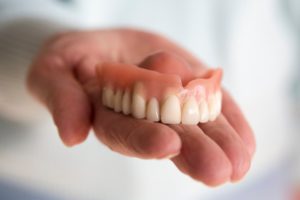
Dentures are life-changing prosthetics that can take your smile from barely to completely functional. That’s why, according to the Simmons National Consumer Survey and U.S. Census data, an estimated 41 million Americans have them! While they’re a reliable, tried-and-true substitute for your natural teeth, they aren’t able to grow and change alongside your mouth and bone structure, meaning they’ll need to be refitted, relined, and eventually replaced. Read on to learn what the relining process looks like and how it works.
Signs You May Need Your Denture Relined
The average lifespan of a denture is between five and 10 years, typically seven. As soon as your teeth go missing, the underlying root structure will no longer be stimulating the jawbone, signaling your body to continue regenerating cells in that area to keep it growing. Over time, this will cause the shape of your mouth, specifically the ridge that your dentures sit atop, to change.
While the average person needs their dentures relined every one to two years, there are some signs that you can keep an eye out for that mean your prosthetic isn’t fitting like it once did, including:
- Oral sores
- Ulcers
- Gum irritation
- Fungal infections (like thrush)
- Loose or shifting dentures
- Difficulty eating or speaking with your dentures
What Happens When a Denture is Relined?
If you keep up with your routine checkups with your dentist, they’ll be able to help you determine whether it’s time to reline your dentures. In some cases, they can even complete the process right there in the office. To help them fit better, they’ll add material to the underside of the foundation of your prosthetic. This will allow your denture to comfortably fit atop your gums and stay secure when you eat or speak.
Different Types of Denture Relining
There are two main types of denture relining: a soft reline or hard reline. If you have tender gums or have had oral surgery that makes your mouth tender, you’ll likely want a soft reline. For this process, your dentist will use a more cushioning material to act as a protective bandage so your dentures don’t sit directly atop a surgical or extraction site and lead to discomfort. This process can typically be completed by your dentist the same day.
A hard reline may require a day or two to be completed, and typically takes place every two or so years. They’ll add a harder acrylic material (like the one that your denture is already crafted from) to adjust the fit of your prosthetic so it fits more securely within the mouth.
This routine denture maintenance is crucial to the health and function of your prosthetic, ultimately allowing you to get the most use out of them. So, while getting your dentures relined may feel inconvenient or like a hassle, just think about how much more time this process will buy you with your replacement teeth!
About the Author
Dr. Natalya Ramsay is a dentist for all the right reasons. She’s especially passionate about helping improve her patients’ quality of life by transforming and rebuilding their smiles, whether they’re affected by damage, tooth loss, or all of the above. She offers a wide range of restorative dental treatments, including leading-edge, modern dental implants and tried-and-true traditional dentures. To schedule an appointment, visit Evans Street Dental’s website or call 503-472-1402.
